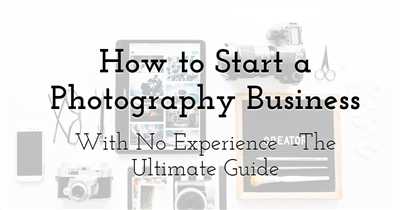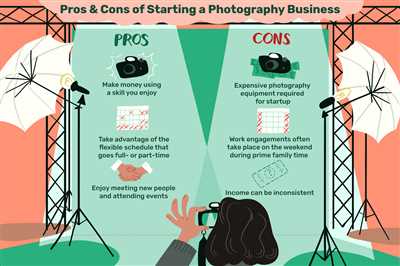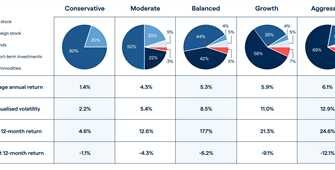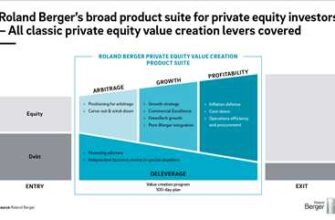
If you’re looking to start your own photography business, there are a few key factors to consider. First and foremost, you need to calculate your goals and determine what you want to achieve with your business. Whether you’re interested in shooting portraits or covering events, it’s important to stay focused and plan your services accordingly.
One of the most important ways to make your photography business successful is by providing a unique and specialized service. Determine your specialty and target audience – this will help you stand out from your competitors and attract clients who are looking for a specific type of photography. For example, if you’re an expert in portrait photography, make sure to prioritize this in your portfolio and marketing.
When it comes to pricing your services, it’s essential to stay competitive. Research what other photographers in your area are charging and decide whether you want to be on the higher or lower end of the pricing spectrum. Keep in mind that providing quality and value should always be your priority, so make sure to charge enough to cover your costs and make a modest profit.
In order to make your photography business more visible to potential clients, it’s important to have a strong online presence. Create a website and social media accounts where you can showcase your work and interact with your audience. Additionally, consider offering tips and expert advice on your blog or through educational content – this will not only help establish you as an authority in your field but also attract potential customers who are looking for photography tips.
Another important aspect of starting a photography business is licensing and payment. Determine how you will handle licensing your images and what payment methods you will accept. Make sure to clearly communicate your policies to your clients and provide them with a good experience from start to finish.
Lastly, don’t underestimate the power of feedback and client satisfaction. Prioritize providing a spot-on and professional service that will leave your customers satisfied and likely to recommend you to others. Take the time to consult with them before the shoot to understand their needs and any specific issues they would like you to address.
Starting a photography business is not always an easy task, but with the right planning and dedication, you can turn your passion into a successful career. Stay focused on your goals, stay true to your brand, and always strive to improve your craft. Remember, there’s always space for good photographers in the market – you just need to determine what makes you unique and valuable to your customers.
- How to start a photography business
- Step 1 Create a business plan
- Calculate your photography business costs
- Deep Dive
- Select a Photography Specialty
- How Much Money Does it Take to Start a Photography Business
- How to Make Money as a Photographer
- Select a Payments System
- Video:
- Starting a Photo Business? Day 1 Financial Headaches You Need To Avoid
How to start a photography business
Starting a photography business is an exciting and rewarding endeavor. Whether you are a hobbyist looking to turn your passion into a profession or a professional photographer looking to branch out on your own, there are a few important steps you should take to get started.
Determine your specialty: Before you can start your photography business, you need to decide what type of photography you want to specialize in. Are you passionate about portraits, landscapes, food photography, or something else? Selecting a specialty will help you target your marketing efforts and attract the right customers.
Create a unique brand: Building a strong brand is essential for any business, and photography is no exception. Think about what makes your photography unique and how you want to present yourself to the world. Consider your target audience and craft a brand that will resonate with them.
Invest in high-quality equipment: While you don’t need to buy every expensive piece of gear on the market, it’s important to have a reliable and versatile set of lenses and a good camera body. Research different options, read reviews, and consider renting equipment before making a final decision.
Develop a system for managing clients: As your photography business grows, you’ll need a way to keep track of bookings, payments, and customer information. Consider using a cloud-based system or software specifically designed for photographers to streamline your workflow.
Start small and build up: In the early stages of your business, it’s important to keep costs under control. You don’t need a large studio space or expensive props to get started. Find a modest space to work from and invest in the essentials. As you gain more experience and clients, you can expand and invest in more equipment.
Get feedback and improve: Feedback from clients and peers is invaluable when starting a photography business. Ask for feedback on your images and services to continually improve. Listen to what your customers want and adapt your offerings accordingly.
Plan your pricing and payment structure: Before you start booking clients, you need to consider the costs of running your business and determine how much to charge. Research your competitors’ pricing, think about the value you offer, and carefully consider how much you need to make to cover your expenses and make a profit. Decide on a payment structure that works for you, such as full payment upfront or a deposit.
Market your business: In order to attract customers, you need to market your business effectively. Utilize social media platforms, create a website to showcase your work, and network with potential clients or other professionals in the industry. Consider offering limited-time promotions or discounts to entice new customers.
Take both general and specialized photos: While developing your portfolio, it’s important to showcase both general photography skills and specialized work in your chosen niche. This allows potential customers to see your versatility and range of skills.
Always keep learning: Photography is a constantly evolving craft, so it’s important to stay up-to-date with the latest techniques and trends. Attend workshops, read books, and follow industry blogs to continue honing your skills and staying ahead of the competition.
Decide on your pricing structure: There’s no right or wrong way to structure your pricing, but it’s important to be consistent and transparent with your customers. Whether you charge per hour, per photoshoot, or offer packages, clearly communicate your pricing so customers know what to expect.
Carefully consider your costs: Starting a photography business can involve considerable costs, such as equipment, insurance, marketing, and more. Take the time to research and estimate your expenses accurately before getting started.
Invest in your skillset: While having high-quality equipment is important, your skills as a photographer are even more crucial. Make sure you invest time and effort into improving your technique, composition, and editing skills. Practice regularly and seek feedback from peers or mentors to continue growing.
Starting a photography business requires careful planning and consideration, but with the right mindset and determination, you can turn your passion into a successful business. Good luck!
Step 1 Create a business plan
Starting a photography business requires careful planning and consideration. A well-thought-out business plan can make all the difference in the success of your brand and photography services. Here are the essential steps to create a strong business plan:
- Determine your specialty: To stand out in a competitive market, it’s crucial to select a photography specialty that aligns with your skills and interests. Whether you want to focus on portrait, landscape, events, food, or any other niche, determine what makes your photography unique.
- Research your target market: Understanding your target audience is essential for effective marketing and capturing the right customers. Consider their preferences, demographics, and photography needs, and tailor your services accordingly.
- Build your portfolio: Having a stunning portfolio is crucial for attracting clients and demonstrating your skills. Invest time and effort into creating a collection of high-quality images that showcase your best work. Include a variety of photos that highlight your expertise in different genres.
- Write a marketing strategy: Develop a marketing plan to promote your photography business. Consider online and offline advertising, social media marketing, networking, and partnerships with other businesses. Determine the best ways to reach your target audience and raise awareness of your brand.
- Create a pricing system: Determine how much you will charge for your photography services. Research the prices charged by similar photographers in your area and consider your skills, experience, and the local market. Take into account any additional services such as photo editing or print orders.
- Establish a payment system: Decide how you will handle payments from clients. Determine if you will require a deposit upfront or if you will accept payments in installments. Consider using online payment platforms to make it easy for customers to pay.
- Address legal and financial issues: Set up the legal and financial aspects of your photography business. Register your business name, obtain any necessary licenses or permits, and consult with an accountant or lawyer to ensure compliance with tax and legal requirements.
- Seek feedback and reviews: Feedback from clients and industry professionals is invaluable for improving your photography skills and building a positive reputation. Encourage customers to provide reviews and testimonials that you can showcase on your website or social media platforms.
- Invest in your craft: Continuous learning and improvement are essential for staying ahead in the photography industry. Attend workshops, conferences, and courses to enhance your skills and stay updated with the latest trends and techniques.
- Build a system for your business: Develop a streamlined process for managing your photography business. This includes organizing client bookings, scheduling photoshoots, editing and delivering photos, and maintaining client records. Utilize software and tools to automate repetitive tasks and ensure efficiency throughout your workflow.
By following these steps and creating a comprehensive business plan, you will be well-prepared to start your own photography business and navigate the challenges and opportunities that come your way.
Calculate your photography business costs
When starting a photography business, it’s important to calculate your costs carefully to ensure you have a clear understanding of your expenses and profits. This will help you make informed decisions and set realistic goals for your business.
Firstly, consider the equipment you will likely need to start your photography business. This includes cameras, lenses, lighting equipment, tripods, and other accessories. These costs can quickly add up, so it’s essential to have a good understanding of the specific photography services you will be providing so that you can decide on the right equipment for your needs.
Next, think about the cost of your transportation. If you plan to photograph events or work on location, you’ll likely need a reliable vehicle to transport your equipment. Consider the expenses for gas, maintenance, and insurance that will be associated with this aspect of your business.
Another important cost to calculate is the amount of time you will dedicate to your photography business. Time is a valuable resource, so it’s crucial to determine how much you are willing to work and how much you expect to earn. Consider the hours it will take to photograph and edit each job, as well as the time needed for client meetings, marketing, and administrative tasks.
In addition to time, you should also consider the cost of any software or editing tools you will need. High-quality editing software can be expensive, but it’s an essential investment for any photographer looking to produce professional-level images. Research the options available to you and decide on the tools that will best suit your needs.
Furthermore, take into account the cost of any necessary licenses or permits, such as business licenses or permits for shooting in specific locations. This ensures that you are legally able to operate your photography business and can protect you from any potential legal issues in the future.
Lastly, don’t forget to factor in your general business expenses. These may include website hosting and development fees, marketing materials, professional development courses, and other miscellaneous expenses. Keep track of all your costs and consider how they will affect your pricing and profit margins.
Calculating your photography business costs may seem like a daunting task, but with careful planning and consideration, you can create a comprehensive budget that aligns with your goals. It’s important to remember that every photography business is unique, so take the time to understand your specific needs and craft a budget that works for you.
Deep Dive
When starting your photography business, it’s important to consider what specific niche or specialty you want to focus on. While it may be tempting to try and capture every type of photography, it’s often more successful to select a specific target audience or genre to aim your services towards. By doing so, you can become an expert in your field and create a unique brand that sets yourself apart from others.
For example, you could decide to specialize in photographing events such as weddings, corporate functions, or family gatherings. By doing this, you can create a portfolio of your work in that specific area and show potential customers that you have the expertise and skills needed to capture the most memorable moments.
When starting a photography business, it’s essential to have good equipment, including high-quality cameras, lenses, and lighting. Investing in the right gear will not only allow you to produce exceptional photos, but it will also give your clients confidence in your abilities. Additionally, make sure you have the necessary licensing and insurance to operate as a professional photographer.
One of the most critical aspects of starting any business is to stay mindful of your target customer. Consider who your ideal client is, what they value, and what message you want to convey through your photography. This will help you create a strong brand image and a clear marketing message that resonates with your target audience.
Another vital factor to consider is pricing your services. While it’s necessary to stay competitive within the market, be careful not to undervalue your work. Calculate the costs associated with running your business, such as equipment, insurance, and travel, and make sure your pricing reflects this. It’s also wise to consult with other photographers or industry experts to get feedback and reviews on your pricing structure.
Freelancing can be a modest way to start your photography business while building your portfolio and gaining more experience. However, as your business grows, you may need to consider ways to scale your operations and secure more consistent income. This could involve offering additional services or expanding your target audience.
Remember that success in the photography business takes time and dedication. It’s essential to continually improve your skills, stay up-to-date with industry trends, and be willing to adapt to changing client needs. By consistently delivering exceptional work and providing outstanding customer service, you’ll be on your way to a thriving photography business.
Select a Photography Specialty
When starting a photography business, one of the first steps is to select a photography specialty. This decision will guide your business and assist in targeting the right customers. There are many different photography specialties to choose from, each with its own unique characteristics and demands. Here are a few popular photography specialties to consider:
- Portrait Photography: Portrait photographers focus on capturing the essence and personality of people through their images. Whether it’s capturing family portraits or individual headshots, portrait photography is a popular choice and a great way to connect with your clients.
- Event Photography: Event photographers specialize in capturing the highlights and emotions of various events, such as weddings, parties, concerts, and corporate gatherings. This specialty requires quick thinking and the ability to adapt to dynamic environments.
- Sports Photography: Sports photographers capture the energy and excitement of athletic events. They have to be skilled in capturing the perfect action shots and freezing fast-moving moments.
- Food Photography: Food photographers showcase delicious dishes in an enticing manner. They use various techniques to make the food look mouthwatering and visually appealing, often working closely with chefs and stylists.
- Landscape Photography: Landscape photographers capture the beauty of nature, from breathtaking sunsets to majestic mountains. This specialty requires patience, as photographers often have to wait for the perfect lighting conditions to capture that stunning shot.
These are just a few examples of photography specialties. It’s important to select a specialty that you are passionate about and that aligns with your skills and interests. By focusing on a specific photography niche, you can access a targeted audience and develop your brand as an expert in that field.
Keep in mind that it’s also possible to offer multiple specialties or expand into different areas later on. The key is to start with a specific specialty to establish your business and build a strong customer base.
When choosing a photography specialty, consider your potential customers and their specific needs. Research the market to identify potential demand and competition. Look for ways to access your target audience and communicate your message effectively to attract clients.
Starting a photography business takes more than just the ability to take good photos. It requires planning, branding, and understanding the business side of things. Investing in high-quality equipment, developing your craft, and building a system for customer service and payments are all essential to a successful photography business.
Finally, engage with the photography community, both online and offline. Connect with other photographers, attend workshops and events, and share your work to gain exposure and learn from others. The photography industry is a vibrant and supportive community, where photographers can learn from each other and collaborate on projects.
So, take the time to select a photography specialty that you are passionate about and that aligns with your skills and interests. It will make all the difference when you start your photography business and begin capturing those sweet moments for your clients.
How Much Money Does it Take to Start a Photography Business

Starting a photography business can be an exciting venture, but it’s important to carefully consider the costs involved before diving in. Here’s a breakdown of what you’ll need and an estimate of how much money you might need to get started:
- Evaluation and Planning
- Equipment
- Workspace
- Marketing and Branding
- Payment and Invoicing
Before buying any equipment, start by evaluating your photography skills and deciding what type of photography you want to focus on. Are you interested in capturing special events, such as weddings and parties? Or are you more inclined towards portraits and studio work? Researching your target audience and analyzing your competitors will help you determine what specialty to pursue.
The cost of equipment will vary depending on the type of photography you choose. For example, sports photographers need fast cameras and long lenses, while portrait photographers can get by with a simpler setup. It’s important to invest in high-quality gear that will produce great images, but be mindful of your budget. Prioritize the essentials and consider buying used equipment to save money.
Decide whether you’ll need a dedicated studio space or if you can work on location. If you do need a studio, factor in the costs of renting or buying a suitable space. Keep in mind that a home studio can be a cost-effective option for beginners.
To attract customers, you’ll need to market your photography business effectively. Create a visually appealing website or portfolio to showcase your best work. Consider offering a few free or discounted sessions to build your portfolio and gather feedback from satisfied customers. Positive reviews and word-of-mouth can do wonders for your business.
Make sure you have a system in place for accepting payments and issuing invoices. Look into different payment processors or platforms that are suitable for photographers. Calculate your pricing structure, taking into account your costs and desired profit margin. Also consider any additional expenses, such as food for location shoots or travel costs for destination photography.
By carefully considering these factors and estimating your costs, you’ll have a better idea of how much money you’ll need to start your photography business. Remember that starting a business is an ongoing process, and you may need to continuously invest to stay competitive and grow your customer base.
How to Make Money as a Photographer
If you have a passion for photography and want to turn it into a profitable business, there are a few careful considerations you need to make. Keep in mind that while photography can be a fulfilling career, it also requires some essential steps to get started and make a steady income. Here are some tips on how to make money as a photographer:
- Define Your Specialty: To stand out in a crowded market, it’s often essential to have a specific niche or specialty. Decide on the type of photography you are most passionate about and target those areas. For example, you can focus on portraits, landscapes, or event photography.
- Build Your Portfolio: Potential clients will always look at your previous work before deciding to hire you. Invest time in building a strong portfolio that showcases your best and most unique photos. Make sure your photos demonstrate your expertise in different styles or subjects.
- Stay Updated: Photography is an ever-evolving field, with new techniques and equipment being introduced regularly. Stay on top of the latest trends and advancements by reading photography blogs, joining workshops or courses, and networking with other photographers.
- Calculate Your Pricing: Determine how much you will charge for your services. Consider factors like your expenses, equipment costs, and the amount of time it takes to complete a project. Research the market and see what other photographers in your area are charging to ensure your prices are competitive.
- Market Your Business: A successful photography business takes more than just great photos. You need to promote your services and reach out to potential customers. Use social media platforms, create a professional website, and leverage word-of-mouth referrals to get your message across.
- Provide Excellent Customer Service: Your reputation as a photographer will largely depend on your ability to provide exceptional customer service. Be professional, responsive, and attentive to your clients’ needs. Going above and beyond can lead to repeat business and positive reviews.
- Build a System: To streamline your business operations, consider implementing a system for organizing client information, scheduling appointments, and managing payments. Investing in photography business software can save you considerable time and effort.
- Offer Additional Services: To increase your income, consider offering additional services such as photo retouching, printing, or creating albums. These add-ons can provide extra value to your clients and generate more revenue for your business.
- Be Mindful of Copyright Issues: Always protect your work by understanding copyright laws and registering your photos when necessary. Watermarking your images and clearly outlining the usage rights in your contracts can help prevent any unauthorized use of your work.
- Network and Collaborate: Connect with other professionals in the industry, such as makeup artists, stylists, or event planners. Collaborating with these individuals can lead to joint projects and referrals, expanding your network and potential client base.
By following these tips and staying dedicated to your craft, you can turn your passion for photography into a profitable business. Keep in mind that success often takes time, so set clear goals and stay focused on providing exceptional services to your clients. With a thoughtful plan and a deep understanding of your target market, you can make a sweet living through your photography business.
Select a Payments System
When starting a photography business, it’s important to have a reliable payments system in place. This will make it easier for your clients to pay for your services and ensure that you are compensated for your work.
There are several options to consider when selecting a payments system for your photography business. One popular choice is to use a third-party platform that allows you to accept credit card payments. These platforms often have user-friendly interfaces and provide secure transactions, giving your clients peace of mind when making a payment.
Another option is to use invoicing software that allows you to send professional invoices to your clients. This is especially useful if you offer a range of photography services, as you can easily calculate the costs for each photoshoot and provide detailed invoices to your clients.
When selecting a payments system, it’s important to think about the needs of your target audience. Consider how your clients prefer to pay and choose a system that accommodates their preferences. For example, if you primarily photograph weddings and events, it may be beneficial to offer a convenience of accepting payment in installments, rather than requiring the full payment upfront.
Additionally, it’s essential to consider the fees associated with the payments system you choose. Some platforms charge a transaction fee or a monthly fee, so make sure to calculate these costs into your pricing structure.
As a photographer, your portfolio is your most important asset. It showcases your skills and expertise, so it’s crucial to have a system in place that protects your images from unauthorized use. Consider adding watermarks or using digital rights management (DRM) technology to prevent others from using your photos without permission.
Furthermore, if you plan on licensing your photographs for commercial use, it’s important to research the licensing laws and understand the rights and limitations associated with different types of licensing agreements. This will ensure that you protect your work and maximize your earning potential.
Overall, selecting a payments system is an important step in starting a successful photography business. Consider your target audience, calculate the costs, and choose a system that aligns with your brand and the services you provide. By doing so, you will make it easy for your clients to pay for your services and help your photography business thrive.









